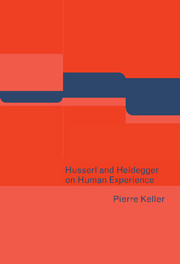Book contents
- Frontmatter
- Contents
- Introduction
- 1 Experience and intentionality
- 2 Husserl's methodologically solipsistic perspective
- 3 Husserl's theory of time-consciousness
- 4 Between Husserl, Kierkegaard, and Aristotle
- 5 Heidegger's critique of Husserl's methodological solipsism
- 6 Heidegger on the nature of significance
- 7 Temporality as the source of intelligibility
- 8 Heidegger's theory of time
- 9 Spatiality and human identity
- 10 “Dasein” and the forensic notion of a person
- Select bibliography
- Index
7 - Temporality as the source of intelligibility
Published online by Cambridge University Press: 02 November 2009
- Frontmatter
- Contents
- Introduction
- 1 Experience and intentionality
- 2 Husserl's methodologically solipsistic perspective
- 3 Husserl's theory of time-consciousness
- 4 Between Husserl, Kierkegaard, and Aristotle
- 5 Heidegger's critique of Husserl's methodological solipsism
- 6 Heidegger on the nature of significance
- 7 Temporality as the source of intelligibility
- 8 Heidegger's theory of time
- 9 Spatiality and human identity
- 10 “Dasein” and the forensic notion of a person
- Select bibliography
- Index
Summary
In this chapter, I discuss the claim that average everyday social practices serve as the condition under which anything is intelligible to us. Against a widely held interpretation of Heidegger, I argue that the average everyday social practices to which one conforms as a member of society do not provide the unique source of intelligibility. Heidegger does think that there is an ultimate source of all intelligibility, or rather of all disclosure and significance. This is his notion of temporality. Temporality is supposed to make our ability to understand language and everyday social practices themselves intelligible to us. Only a very rich notion of temporality is up to this job. This notion of temporality already contains an essential relation to space, language, understanding, social roles, and moods in itself, so Heidegger's claim about temporality as the source of intelligibility is less exciting than it first seems to be. But temporality still has an important unifying function to play in connecting the various dispositions that are fundamental to human existence together in a human life.
Heidegger's grounding of knowledge claims and practical engagements in everyday experience has suggested to many philosophers that his position should be assimilated to that of Wittgenstein and pragmatists such as Dewey. There are, indeed, important resemblances between Heidegger's critique of the philosophical tradition, and those developed by Wittgenstein and Dewey. According to a view that is generally ascribed both to Wittgenstein and pragmatists such as Dewey, meanings do not exist independently of the practices and institutions that give structure to the beliefs of particular individuals. Institutions in society provide the standards against which the grasp of meanings is measured.
- Type
- Chapter
- Information
- Husserl and Heidegger on Human Experience , pp. 156 - 183Publisher: Cambridge University PressPrint publication year: 1999



